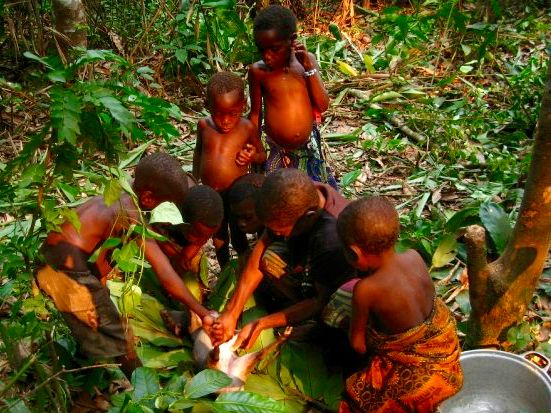
Evidence that our gut microbiomes influence our physical and mental health has been piling up in recent years. But what shapes our intestinal flora in the first place? To find out, researchers surveyed the microscopic life inside two central African groups, one hunter-gatherers, the other farmers, and found that as our lifestyles have evolved, our digestive systems have evolved along with us.
The idea for the study, published in Cell Reports, came to microbial ecologist Andres Gomez, a staff scientist at the J. Craig Venter Institute, while working in the rainforest at the southwestern tip of the Central African Republic. He was studying the gut microbiomes of wild gorillas with the help of the local BaAka people.
"The BaAka are gorilla trackers," says Gomez. "I found them fascinating. Their lifestyle has so few Western influences that they are almost true hunter-gatherers." The community lives on wild plants, game and fruits. In the same area, Bantu people live as farmers, keep livestock and depend on the market to survive, which puts them in contact with Westernized diets, food additives and antibiotics.
Gomez realized that the two peoples could be seen as stand-ins for two stages of human social evolution. "The hunter-gatherers could possibly represent ancient humans, with agriculturalists representing a transition to the Western lifestyle," he says.
Curious about the difference between the two peoples' gut microbiomes, the research team analyzed fecal samples from just under 30 people of each group. They found a significant difference. "They have roughly the same kind of microbes," says Gomez, but "the abundance of specific microbes was different between the two."
At the phylum level, a broad classification of similar life forms, Bacteroidetes made up a far larger portion of the BaAka's digestive ecosystems compared to Firmicutes, another phylum, than they did in the Bantu's. Bacteroidetes are believed to help digest tough plants and their abundance relative to Firmicutes tends to drop in obese people.
Researchers also found that two genera, a more specific classification, called Prevotella and Treponema were lower in the Bantu. These microbes are also suspected of breaking down fibrous plants. "Those taxa are what we have consistently found enriched in hunter-gatherers around the world, and that I have found in gorillas," says Gomez.
The Bantu may have lost some of this part of their microbiome as they've adopted more Westernized diets and behaviors. "We believe these patterns are connected," says Gomez, "and that's why we included American microbiomes in our comparison." To do that, the researchers compared their findings with data on the gut microbiomes of United States residents collected by the Human Microbiome Project. Of the three peoples studied, Americans had the smallest number of Prevotella and Treponema.
"These genera were almost zero in the Americans," says Gomez. "The Bantu were right in the middle. Across evolution, the reason we've lost this microbiome is that we've shifted to modern lifestyle patterns."
Uncommon Knowledge
Newsweek is committed to challenging conventional wisdom and finding connections in the search for common ground.
Newsweek is committed to challenging conventional wisdom and finding connections in the search for common ground.
About the writer
To read how Newsweek uses AI as a newsroom tool, Click here.





